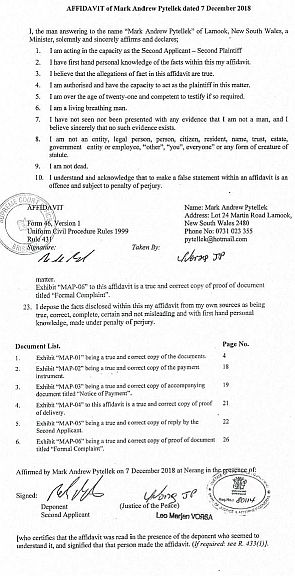
"The Guru class are nothing more than Conmen"
In Meads v. Meads, 2012 ABQB 571, Associate Chief Justice J.D. Rooke coined the term "Organized Pseudolegal Commercial Argument" litigants, to functionally define them collectively for what they literally are.People like Australian conman Mark Andrew Borleis/Pytellek, that promote, sell, and use a collection of techniques and arguments to disrupt court operations and to attempt to frustrate the legal rights of governments, corporations, and individuals.
In plain English, it's nonsense/bunk/garbage.)
[Pytellek and other] "[73]...Gurus
claim that their
techniques provide easy rewards – one does not have to pay tax, child
and
spousal support payments, or pay attention to traffic laws. There are
allegedly
secret but accessible bank accounts that contain nearly unlimited
funds, if you
know the trick to unlock their gates. You can transform a bill into a
cheque
with a stamp and some coloured writing. [See Pytellek's A4V Process] You are only subject to
criminal
sanction if you agree to be subject to criminal sanction. You can make
yourself
independent of any state obligation if you so desire, and unilaterally
force
and enforce demands on other persons, institutions, and the state. All
this is
a consequence of the fact gurus proclaim they know secret principles
and law,
hidden from the public, but binding on the state, courts, and
individuals.
"[74]
And all these “secrets” can be yours, for small payment to the
guru.
[75] These claims are, of course, pseudolegal nonsense. A judge who
encounters and reviews OPCA concepts will find their errors are obvious
and manifest, once one strips away the layers of peculiar language,
irrelevant references, and deciphers the often bizarre documentation
which accompanies an OPCA scheme. When reduced to their conceptual
core, most OPCA concepts are contemptibly stupid.
... particularly his favourite:
In Meads v. Meads, Associate Chief Justice J.D. Rooke continued:
[78] Mediaeval alchemy is a helpful analogue. Alchemists sold their services based on the theatre of their activities, rather than demonstrated results, or any analytical or systematic methodology. OPCA gurus are modern legal alchemists. They promise gold, but their methods are principally intended to impress the gullible, or those who wish to use this drivel to abuse the court system. Any lack of legal success by the OPCA litigant is, of course, portrayed as a consequence of the customer's failure to properly understand and apply the guru's special knowledge.
[79] Caselaw that relates to Gurus, reviewed below, explains how gurus present these ideas in seminars, books, websites, and instructional DVDs and other recordings. They provide pre-prepared documents, which sometimes are government forms, and instruct how to fill in the necessary information that then produces the desired effects. Gurus write scripts to follow in court. Some will attempt to act as your representative, and argue your case.
cannot even explain their own materials.
They did not write them.
They do not (fully) understand them
[80] When gurus do appear in court their schemes uniformly fail, which is why most leave
 court
appearances to their customers. That
explains why it is not unusual to find that an OPCA litigant cannot
even explain their own materials. They did not write them. They do not
(fully) understand them. OPCA litigants appear, engage in a
court drama that is more akin to a magic spell ritual than an actual
legal proceeding, and wait to see if the court is entranced and
compliant. If not, the litigant returns home to scrutinize at what
point the wrong incantation was uttered, an incorrectly prepared
artifact waved or submitted.
court
appearances to their customers. That
explains why it is not unusual to find that an OPCA litigant cannot
even explain their own materials. They did not write them. They do not
(fully) understand them. OPCA litigants appear, engage in a
court drama that is more akin to a magic spell ritual than an actual
legal proceeding, and wait to see if the court is entranced and
compliant. If not, the litigant returns home to scrutinize at what
point the wrong incantation was uttered, an incorrectly prepared
artifact waved or submitted."... Nothing more than conmen"
Mark Pytellek: Scammer or the Real Deal?
Do your own research...
= = = = = = == = = =
For more insight into con artists and scammers like Borleis/Pytellek,
read the "Reasons for Decision of the Associate Chief Justice J.D. Rooke"
Meads v. Meads 2012 ABQB 571
And also what others have said about Mark Pytellek
Good Luck